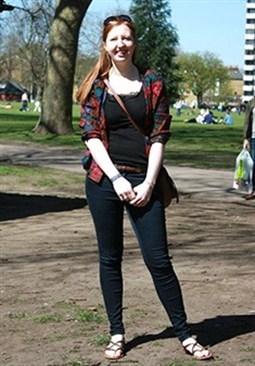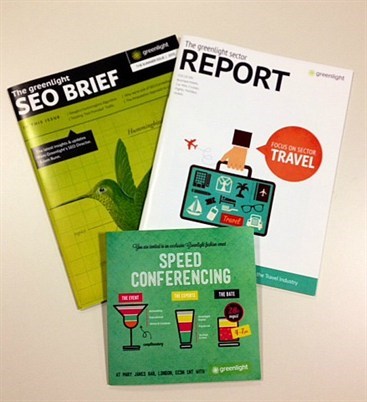Name: Catherine Pearson

Bio: I've always had the art bug and skipped off to art college at 18 without too many practical concerns (Damien Hirst was a millionaire wasn't he?). I studied a BA (Hons) in Graphic Design and Art History in Dublin. When I graduated I landed a job with a big multinational photography company, where I learnt a lot about image processing and commercial image trends working with the production services team. Seeing the growth of digital advertising there I went on to study for an MSc in Interactive Digital Media at Trinity College Dublin, where I picked up programming and interaction design skills. I worked as a freelance designer and as a digital project manager with a web agency in Dublin for a while, before starting with Greenlight when I moved to London a little over a year ago.
Describe your role within Greenlight and a summary of what you do.
Design briefs in all shapes and sizes turn up on my desk at Greenlight and there is a great amount of variety in the work that we get. One day I might be doing illustrations for an infographic and the next I could be creating invitations for an Outreach event or designing a new blog for a client.
What skills does do you need in your role?
You need to be a bit of a 'Jekyll and Hyde' to succeed as a web designer. First you need to have fluffy creative skills to come up with a great design concept, and then you need to pull out some serious technical skills to make your ideas actually happen using software and code. It's also essential to have time-management and communication skills and a heap of determination.
Describe a typical working day...
7am: Still dozing happily in my bed! I live a 15 minute walk from the office, so I probably won't be awake for almost another hour...which is just as well as I tend to be a bit of a night owl.
9am: I usually get straight into reading my emails and checking a few staple web design blogs for trends and news. Next, I'll check my tickets in Assembla and get through any small or urgent tasks first so I have a good stretch of the day free to focus on larger design projects.
11am: I'm in the zone. At this stage I'm completely immersed in trying to design an eye-catching solution for the latest brief I'm working on. At the moment our team is busy with loads of Christmas campaigns so I'm doing digital illustrations of some Christmas decorations and animating them using CSS3 transitions.
1pm: It's lunch time and my eyes are starting to go square. I usually get out for a quick stroll and a sandwich around Spitalfields Market or head to the gym for a class if there's time.
3pm: I've been making good headway into the latest campaign and now it's time for a creative brainstorming meeting with some account managers and copywriters for the next project coming down the line. It really helps to have a chance to bounce ideas off other team mates.
5pm: I just got some feedback from a client on an infographic that is nearly finished, so I quickly make a few requested tweaks and changes to the design, before sending the updated version back over to the account manager for approval.
6pm: I'm either on my way home to do some more drawing and doodling in front of the TV or if it's later in the week heading out around east London with friends...usually to find a good exhibition opening with free wine somewhere!

What do you like/dislike about your job?
Like: It's brilliant to be able to get up and do something that I'm passionate about every day.
Dislike: Sitting in front of a computer for too long and getting square eyes! Most of my best work starts when I'm sitting down with a pen and paper, or bouncing ideas off team mates so I try hard not to get completely glued to my monitor all day.
What advice would you give to a budding digital designer?
Work hard, and just keep on being productive and creative! Potential employers don't want to hear about what you can do, they want you to show them, so building up a great portfolio is essential. Being able to code well too will give you an extra competitive edge.

